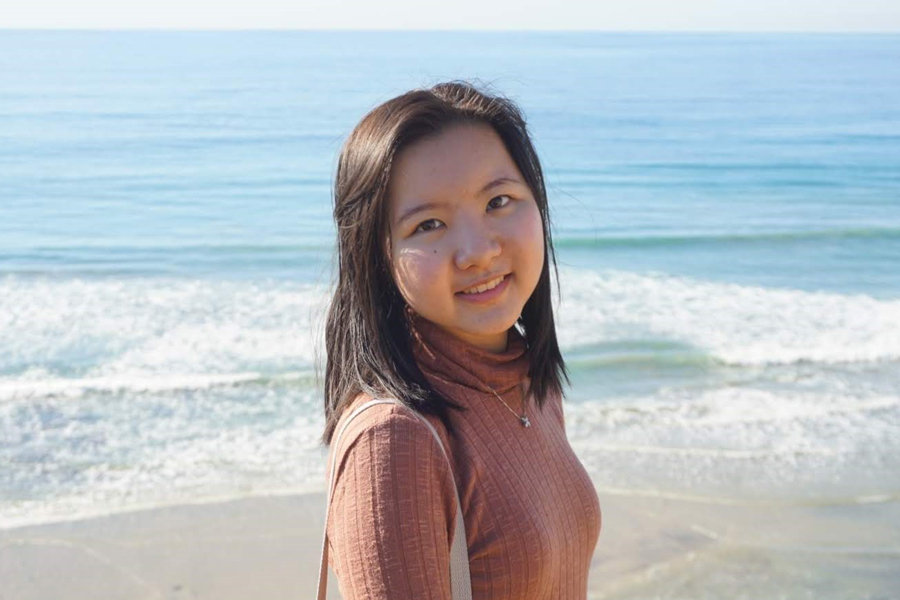An Academic Safe Haven

Name: Carolyn Chen
Home Country: United States
Degree: Certificate in Chinese and American Studies ’25
Coming to the Hopkins-Nanjing Center gave me an opportunity to further immerse myself in China and its contemporary situation in a practical way. I also saw it as an academic safe haven to discuss the U.S. and China, both two very important countries to me, from a variety of perspectives.
Tell us about your background and how you became interested in China.
As a Chinese American student, I grew up immersed yet distant from my heritage. My parents are both from the Jiangsu region and I was not entirely unfamiliar with Nanjing, having visited in the summer every few years. My own community prior to college was a town in Southern California with a predominantly Asian population, Chinese language classes and cultural festivities and a great selection of Chinese restaurants, but I still didn’t know much about China itself. I had felt a sort of disconnect from my background until I decided on a whim to take a medieval Chinese literature course in my first year of undergraduate studies. I was immediately hooked, and started in-depth studies in Chinese literature and language, supplemented by classes on Chinese history, religion, art and film. This culminated in a comparative literature senior thesis that compared English and Chinese poetry from the angle of Chinese philosophy.
What made you choose the Hopkins-Nanjing Center?
In my studies discussed above, we inevitably touched upon social issues, revolution, and other complex topics. I was still studying China using mostly English and far removed from the actual country. Coming to the Hopkins-Nanjing Center gave me an opportunity to further immerse myself in China and its contemporary situation in a practical way. I also saw it as an academic safe haven to discuss the U.S. and China, both two very important countries to me, from a variety of perspectives.
I believe any experience you have with the Chinese language is a step to improvement and better understanding
How was your experience adjusting to the Chinese course work? Do you have any tips for future students?
The first few weeks were tough, both for the readings and classes, where there were lots of unfamiliar terms. This goes for most international students coming into the Hopkins-Nanjing Center. However, things get better after several classes. I prefer to take both digital notes and handwritten ones and found that keeping a special list of vocabulary phrases for each class helped. And of course, keep the HNC motto “study hard, play hard” in mind. Since you’re in China already and the wonderful city of Nanjing, you’ll naturally be soaking up Chinese by navigating around, interacting with locals, and reading food menus. I believe any experience you have with the Chinese language is a step to improvement and better understanding, so don’t stress yourself out too much on coursework only. Try to engage with the environment outside of academics as well. Every little bit helps!
If you are involved in any extracurricular activities or student groups, could you please tell us about that?
I am involved in the calligraphy interest group, which I was extremely excited to join ever since learning Chinese calligraphy informally in college for a few years. Calligraphy not only helps with recognizing Chinese characters but is also a great way to calm your mind, temper your patience, and settle down in the tumult of city life and difficult coursework. With more practice, I hope my calligraphy gets good enough to write couplets for friends and family!
What has been one of your favorite experiences at the Hopkins-Nanjing Center so far?
I would definitely say going out to meals with a large group of HNC colleagues! Food in America is not cheap, and I was surprised at how much of bonding with others in China revolved around enjoying good food. Chinese people love talking about food and having good food! Whether it was going to a restaurant in Xinjiekou sharing a variety of dishes around the table or having a group hot pot dinner at Haidilao with 15+ people, the meals and good company have been one of my favorite parts of being at the HNC. Students are always ready to organize outings to restaurants, try out new places, and bring everyone along.
What do you plan on pursuing after graduation? Where do you see yourself 5-10 years after graduation?
I hope to pursue law or work in a law-related field. Through my background in literature, I’ve always been interested in publication and thus intellectual property and copyright law. At the same time, it would be ideal to bring in my Chinese language skills into the legal sphere too. In around five to ten years, I would like to be working at a bilingual law firm in the U.S.
If you could give one piece of advice to future HNC students, what would that be?
Go for things you usually wouldn’t do, whether it's joining in on a student-run HNC activity, trying an unfamiliar dish, or conversing with strangers. You never know if it might lead to new friendships, new hobbies, or even just a memorable experience that further enriches your experience abroad.
If you are looking to learn more about what it's like to be a current student at Johns Hopkins SAIS, we encourage you to schedule a virtual appointment with one of our Admissions Fellows.
Enjoyed reading Carolyn's experience? Learn more about our Certificate in Chinese and American Studies.
Back to Student Stories